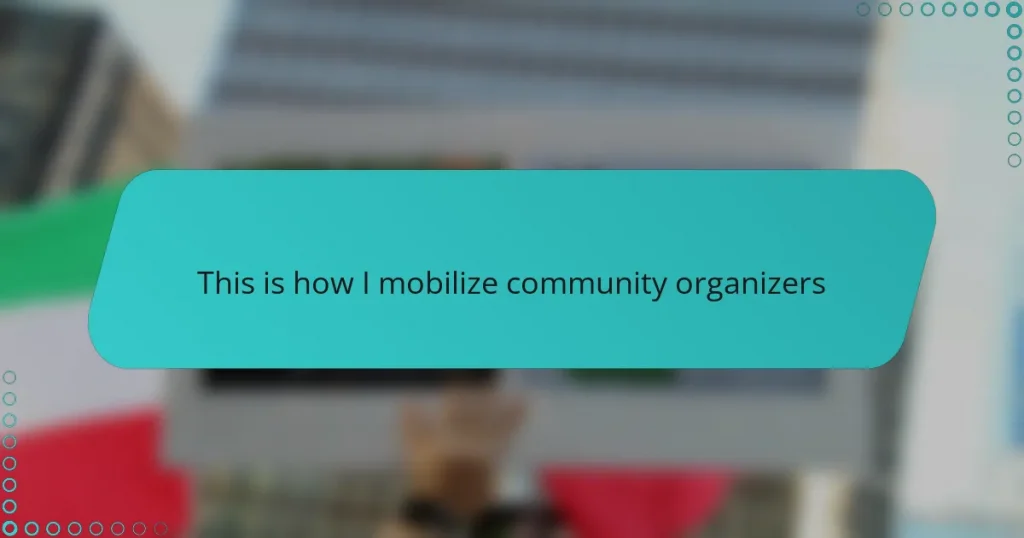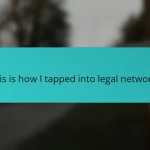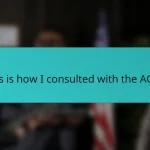Key takeaways
- Legal advocacy empowers community organizers by enabling them to leverage knowledge of the law for meaningful change and collective action.
- Building trust through consistent presence and genuine listening is crucial for effective mobilization and community engagement.
- Effective strategies for community organizers include establishing clear goals, leveraging existing networks, and maintaining open communication.
- Measuring success involves recognizing both tangible outcomes and the intangible growth of trust and resilience within the community.
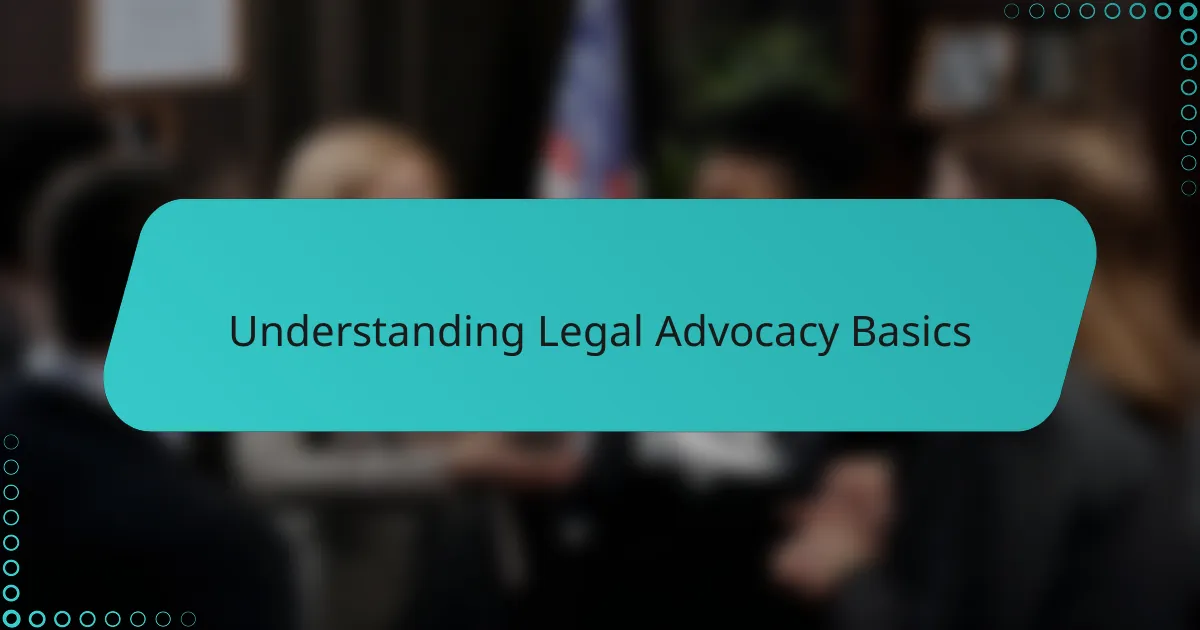
Understanding legal advocacy basics
Legal advocacy, at its core, is about using the law as a tool to create change. I’ve seen community organizers become unstoppable once they grasped that legal advocacy isn’t just for lawyers—it’s a powerful way to amplify voices and hold systems accountable. Have you ever wondered how understanding a simple regulation can shift an entire neighborhood’s fate? That realization always sparked a new level of determination in those I’ve worked with.
From my experience, legal advocacy hinges on knowledge and strategy. It’s not enough to know the law; you need to know how to navigate it, where the leverage points are, and when to push for policy change versus direct action. I recall one organizer who transformed their approach after learning to read legal documents—they went from feeling powerless to crafting demands that no official could ignore.
Most importantly, legal advocacy requires persistence and heart. The law can be slow and often frustrating, but it’s in those moments of challenge that community organizers discover their resilience. When I’ve witnessed their breakthroughs, it’s clear that understanding these basics doesn’t just inform their work—it fuels their passion to fight for justice. Don’t you think that kind of empowerment is exactly what drives real, lasting change?
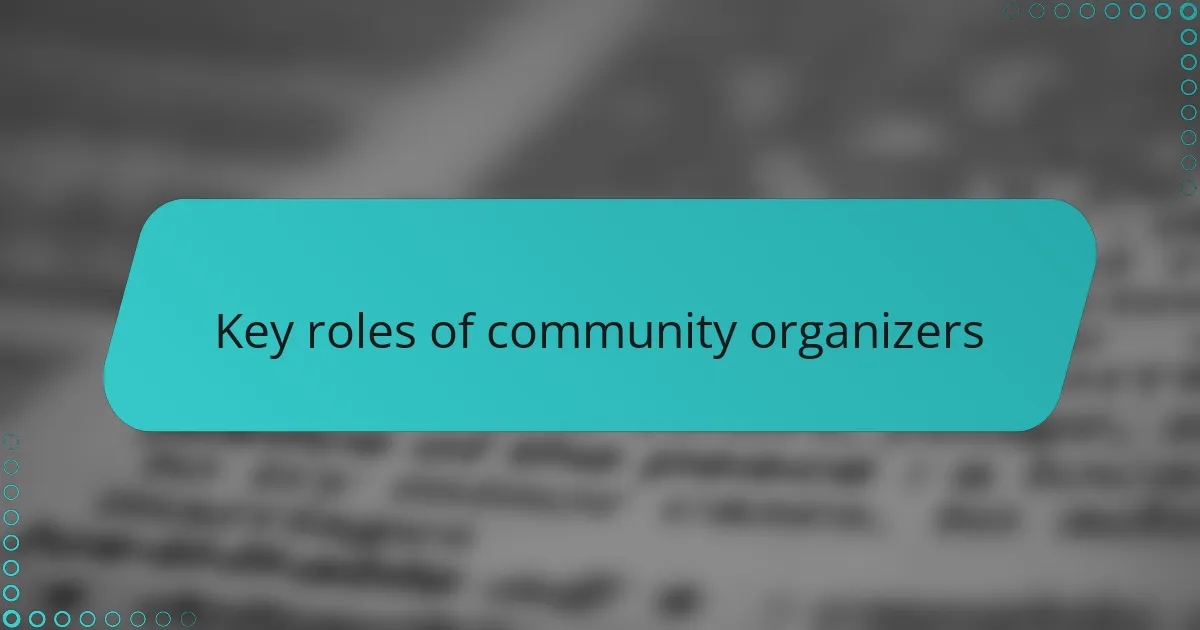
Key roles of community organizers
Community organizers wear many hats, but above all, they are connectors—linking individuals to one another, to resources, and to opportunities. I remember working alongside an organizer who tirelessly mapped out local stakeholders, turning fragmented voices into a unified force. It amazed me how this simple role of bringing people together created a ripple effect across the community.
Listening deeply is another crucial role that often goes unspoken. When organizers truly hear the concerns and stories of their neighbors, they build trust that becomes the bedrock for collective action. Have you ever noticed how genuine listening transforms skepticism into hope? That’s the magic I’ve seen time and again in successful advocacy efforts.
Finally, organizers are strategists who blend vision with practicality. They identify problems, anticipate obstacles, and formulate plans that make complex legal advocacy understandable and achievable. One organizer once told me, “It’s about turning the big fight into small, winnable steps.” Seeing that focus in action reminded me how essential clear strategy is to turning passion into progress.
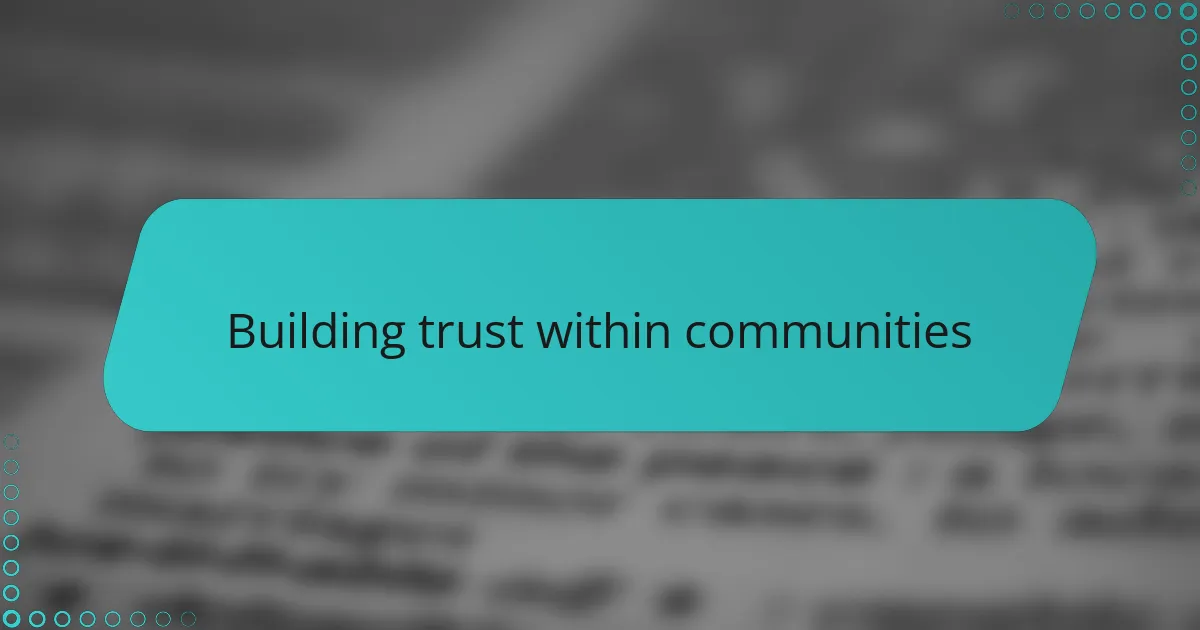
Building trust within communities
Building trust within communities is a gradual, but deeply rewarding process. I’ve seen how simply showing up consistently—being present at local events, listening without rushing to offer solutions—can break down walls of suspicion. Have you ever noticed how people start opening up once they realize you’re genuinely there for them, not just to push an agenda?
There was one moment I won’t forget: a long-standing neighborhood skeptic finally approached me after months of quiet support, saying, “You’re the first person who didn’t make me feel like a problem.” That trust transformed everything—it paved the way for open conversations and collective action. It taught me that trust isn’t given; it’s earned through patience and authenticity.
Trust also thrives on transparency. When community members see organizers sharing information honestly, even about the challenges and limitations ahead, it builds credibility. I often remind myself: isn’t it better to be upfront about what we can’t control than to lose faith later? That kind of honesty creates a foundation where real advocacy can grow.
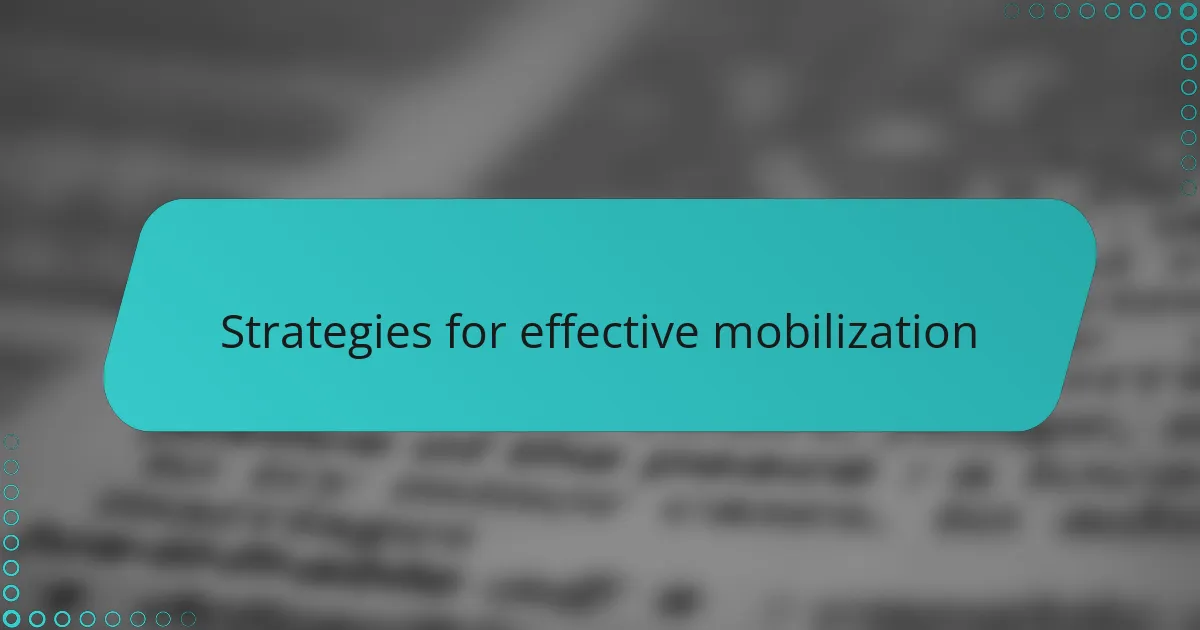
Strategies for effective mobilization
One strategy I’ve found invaluable is creating clear, shared goals that everyone, from seasoned organizers to new volunteers, can rally around. When the purpose is crystal clear, it’s easier to motivate people and keep momentum going—even when the work gets tough. Have you ever noticed how a simple, well-articulated vision can light a fire in a room?
Another approach is tapping into existing relationships and networks within the community. I recall a time when an organizer leveraged their connection with a local faith leader, which instantly expanded our reach and brought new energy into the campaign. This reinforced for me the power of starting with who you know before trying to bring in strangers.
Finally, I emphasize the importance of clear, consistent communication. Whether it’s regular check-ins, sharing victories big and small, or addressing concerns head-on, keeping everyone informed builds a sense of ownership. Don’t you think people are more likely to stay engaged when they feel like true partners rather than just cogs in a machine? That’s the dynamic I strive to foster in every mobilization effort.
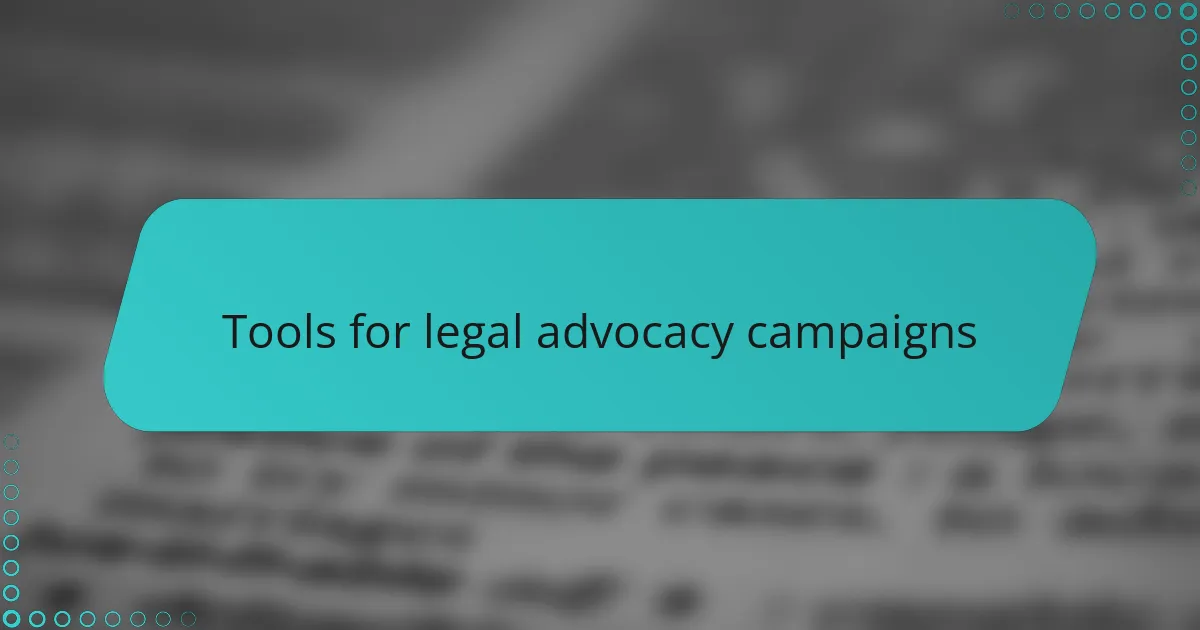
Tools for legal advocacy campaigns
When I think about the tools that make legal advocacy campaigns effective, digital platforms stand out immediately. They’re not just about posting updates; these tools enable organizers to coordinate actions, track legal developments, and mobilize supporters quickly. Have you ever noticed how a well-timed email or social media post can suddenly turn scattered efforts into a focused movement? That instant connectivity has been a game-changer in many of the campaigns I’ve supported.
Beyond communication, I’ve seen how legal research databases empower community organizers by giving them direct access to statutes, court rulings, and policy analyses. It’s like handing them the keys to the legal kingdom—no longer do they have to rely solely on lawyers. One organizer told me how discovering a precedent relevant to their fight reignited their whole strategy and gave them newfound confidence to push forward.
Then there’s the power of mapping and data visualization tools. I’ve watched community members’ eyes light up when complex legal issues are translated into clear, visual maps or graphs. It turns abstract problems into concrete, understandable realities that everyone can rally behind. Doesn’t making information accessible and compelling help people to not just follow the campaign—but to own it? From my experience, these tools are invaluable for turning awareness into action.
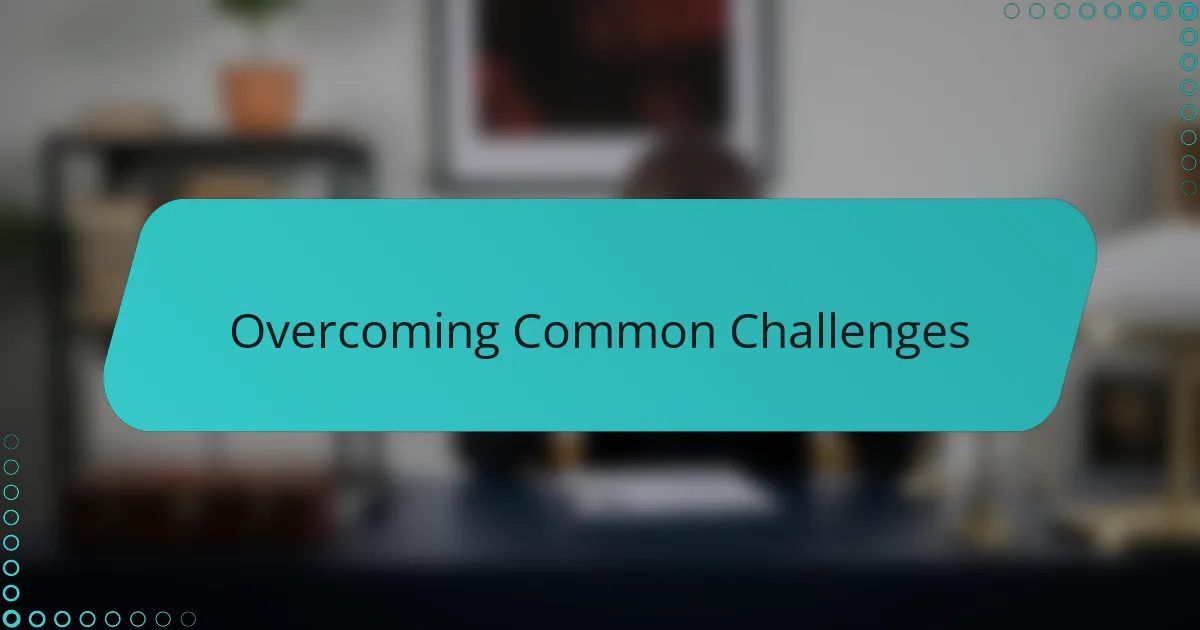
Overcoming common challenges
Facing challenges in mobilizing community organizers is inevitable, but I’ve found that recognizing the fears behind resistance makes a huge difference. Many worry their voices won’t be heard or that the legal world is too complicated. When I take time to validate these feelings and share stories of others who once felt the same, it opens the door for new confidence to grow.
In another experience, communication breakdowns almost derailed a campaign I was part of. What helped was establishing small, consistent check-ins—not formal meetings, just honest conversations where everyone could voice doubts or frustrations. Have you ever noticed how simply feeling heard can turn tension into teamwork? That simple shift saved the day and reminded me that patience often outweighs urgency.
Sometimes limited resources feel like an insurmountable wall. Though it’s tough, I’ve seen how creativity steps in—using free legal clinics, tapping volunteers’ diverse skills, or partnering with local organizations to stretch support. Doesn’t problem-solving under pressure always bring out unexpected strengths? That resilience is what makes a community truly unstoppable.
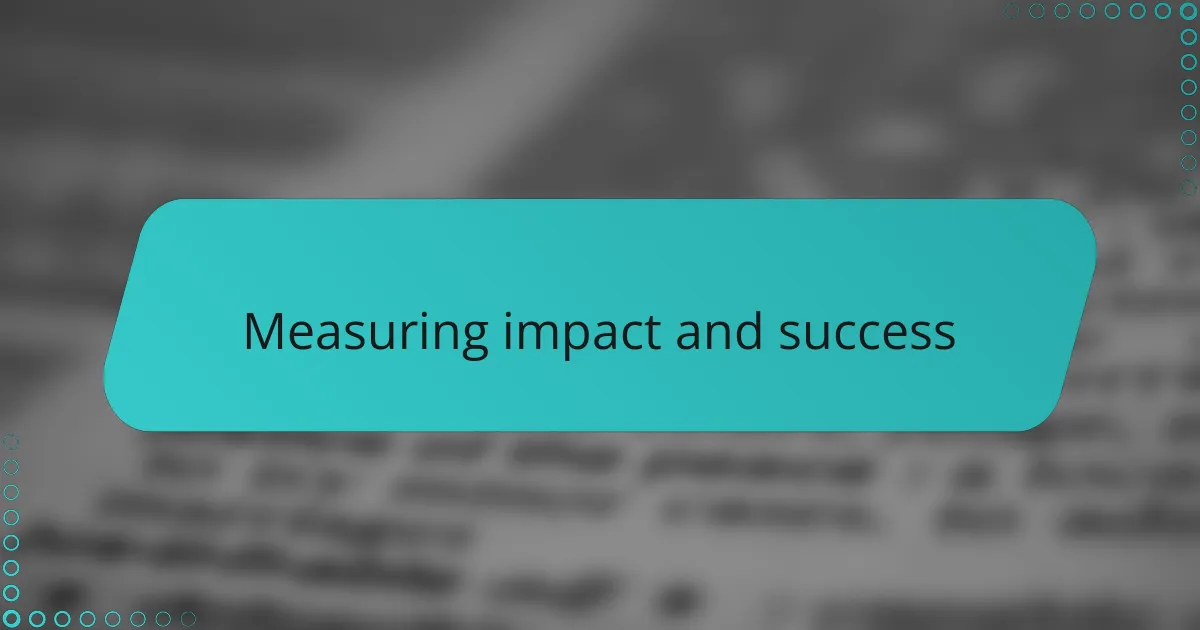
Measuring impact and success
Measuring impact and success isn’t just about counting wins or tracking numbers—it’s about understanding how community organizers grow and how their efforts ripple through lives. I’ve noticed that when organizers see real changes, no matter how small, it fuels their passion in ways raw data never could. Have you ever felt the thrill when a campaign’s quiet progress suddenly turns into a neighborhood victory? That moment confirms that the hard work was worth it.
Sometimes the most meaningful success is intangible—trust built, voices amplified, and resilience strengthened. I remember an organizer who, after months of persistent effort, didn’t just win a legal battle but shifted how their entire community saw its own power. That kind of transformation can’t be measured in reports alone, but it’s what stays with me as true impact.
Still, having clear metrics is essential to keep the momentum going. Tracking legal milestones, attendance at meetings, and feedback from community members helps us learn what’s working and where to adjust. Isn’t it helpful to have concrete benchmarks that guide your next steps while honoring the deeper, personal victories along the way? From my experience, balancing both perspectives is key to mobilizing with purpose.
